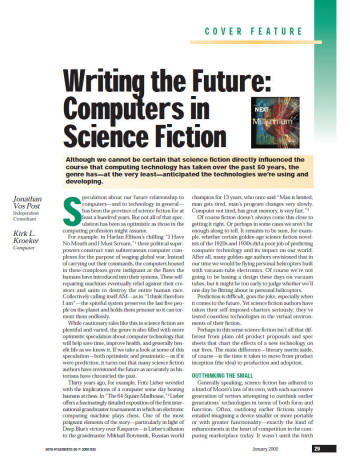Writing the Future: Computers in Science Fiction
By Kirk L. Kroeker & Jonathan Vos Post
Although we cannot be certain that science
fiction directly influenced the course that computing
technology has taken over the past 50 years, the genre
has—at the very least—anticipated the technologies we’re
using and developing.
Speculation about our future relationship to
computers—and to technology in general— has been the
province of science fiction for at least a hundred years.
But not all of that speculation has been as optimistic as
those in the computing profession might assume. For example,
in Harlan Ellison’s chilling “I Have No Mouth and I Must
Scream,”1 three political superpowers construct vast
subterranean computer complexes for the purpose of waging
global war. Instead of carrying out their commands, the
computers housed in these complexes grow indignant at the
flaws the humans have introduced into their systems. These
self-repairing machines eventually rebel against their
creators and unite to destroy the entire human race.
Collectively calling itself AM—as in “I think therefore I
am”—the spiteful system preserves the last five people on
the planet and holds them prisoner so it can torment them
endlessly.
This article was published in IEEE Computer, vol. 33, no. 1, Jan. 2000,
pp. 29-37.
This piece
won an APEX 2000 award for
magazine writing.
(download
the PDF)

|